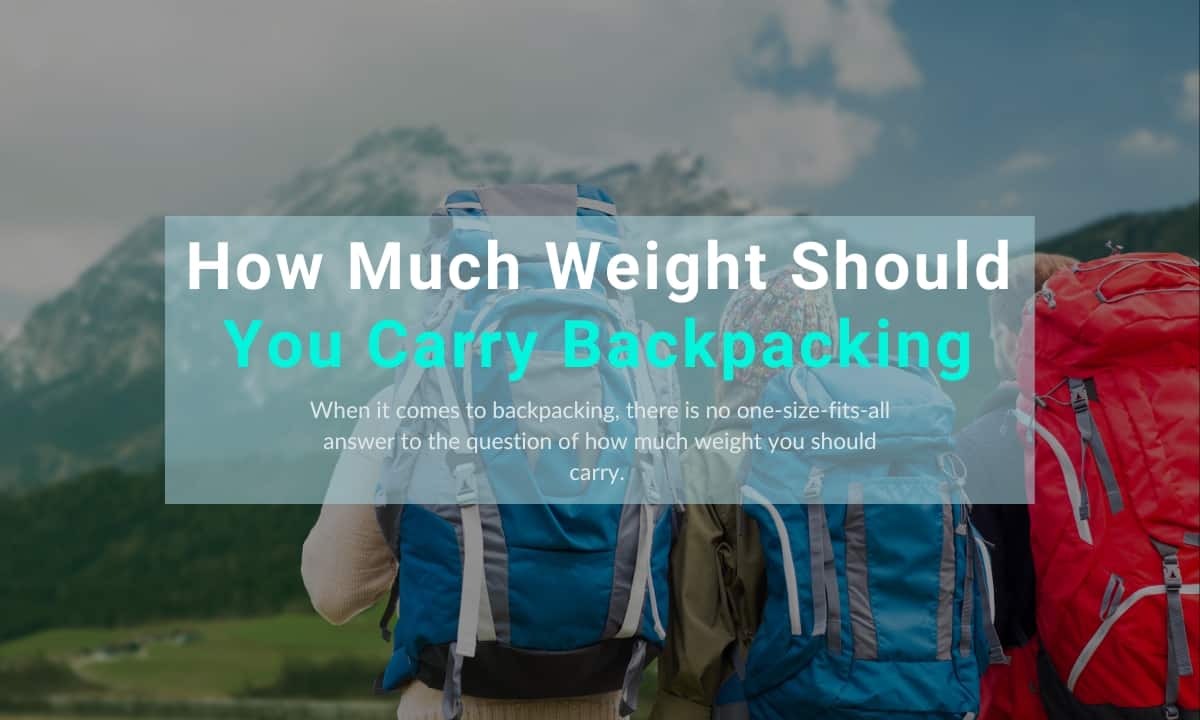Assuming you are talking about backpacking through the wilderness, the answer to how much weight you should carry depends on a few factors. First, consider the terrain you’ll be hiking through. If it’s mostly flat with some occasional hills, you can afford to carry more weight than if you’re dealing with constant elevation changes.
Second, take into account the weather conditions. If it’s hot and sunny out, carrying extra water and food will be more of a burden than if it’s cold and wet. Finally, think about how long your hike will be.
The longer the distance, the lighter your pack should be since you’ll have to carry it for a longer period of time. A general rule of thumb is that your backpack should weigh no more than 10-15% of your body weight. So if you weigh 150 pounds (68 kg), your pack should not exceed 15 pounds (6.8 kg).
Of course, this is just a guideline and ultimately it’s up to you to decide how much weight you’re comfortable carrying. If you’re new to backpacking or hiking in general, start with a lighter load and work your way up as needed.
When it comes to backpacking, there is no one-size-fits-all answer to the question of how much weight you should carry. The amount of weight you can comfortably carry will depend on many factors, including your physical fitness level, the terrain you’ll be hiking on, and the length of your trip. That said, a good general rule of thumb is to keep your backpack’s base weight (the weight of everything in your pack excluding food, water, and fuel) to 10% or less of your body weight.
So if you weigh 150 pounds, aim for a base weight of 15 pounds or less. Of course, this is just a guideline – ultimately it’s up to you to decide what feels comfortable for you. If you’re new to backpacking or aren’t quite sure how much weight you can comfortably carry, start by packing light and gradually adding items until you find that sweet spot.
A little trial and error is often necessary in order to find out what works best for you. And remember – even experienced backpackers have been known to strip down their packs from time to time when they realize they’re carrying more than they need!
How To Pack The Right Amount Of Weight For Backpacking
How Much Weight Do Hikers Carry?
How Much Weight Do Hikers Carry? The amount of weight that hikers carry varies depending on the individual and the hike itself. For example, day hikes may require less gear and food than multi-day backpacking trips.
Additionally, some people are able to travel lighter than others. That being said, most hikers try to keep their pack weight between 15-30% of their body weight. So, if you weigh 150 pounds, your goal would be to carry between 22.5 and 45 pounds.

Of course, there are always exceptions to this rule – sometimes you may need to carry more or less depending on the circumstances. There are a few different factors that will affect how much weight you can comfortably carry on a hike. First, consider the length of the hike and how much food and water you will need.
If you’re only going out for a day hike, you probably won’t need to bring as much as someone who is planning on spending several days in the wilderness. Second, think about what kind of terrain you’ll be hiking in – rough terrain may slow you down and make it difficult to carry a heavy pack (plus, your legs will probably get tired quicker). Finally, take into account the weather conditions – hot weather will make you sweat more and require more water; cold weather may cause you to pack extra clothes; etc.
Ultimately, it’s up to each individual hiker to decide how much they can reasonably carry without causing themselves undue hardship (or putting themselves in danger). A good rule of thumb is to start with a lighter load and gradually add items until you reach a comfortable carrying capacity. This way, you can avoid having too much or too little gear on your hike.
Is 20 Pounds Too Heavy for a Backpack?
There is no definitive answer to this question as it depends on a number of factors, such as the individual’s body size and strength, the type of backpack, and what will be carried inside it. However, in general, 20 pounds may be too heavy for a backpack if it causes discomfort or pain when worn for extended periods of time. Additionally, a backpack that is too heavy can lead to poor posture and spinal problems.
If you are unsure whether 20 pounds is too heavy for your particular backpack, it is best to consult with a salesperson or medical professional.
Is 40 Lbs to Heavy of a Backpack?
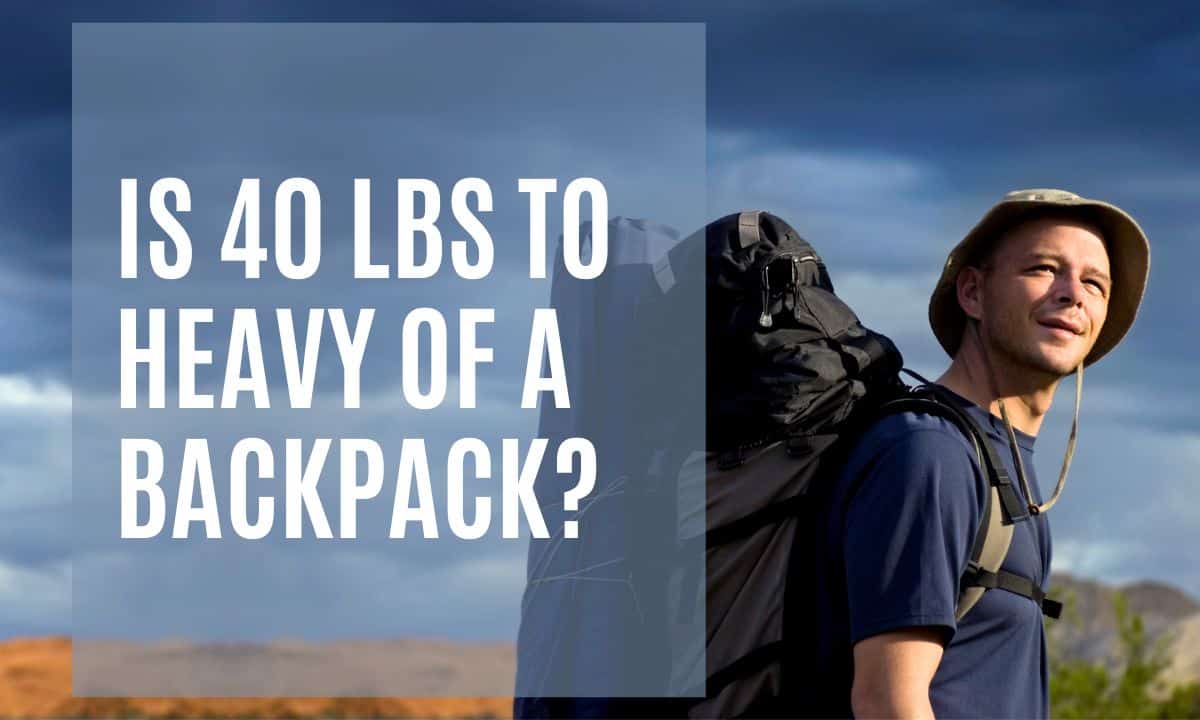
A 40 lb backpack is certainly on the heavy side, but it really depends on a few factors as to whether or not it is too heavy. First, consider the person wearing the backpack. If they are relatively small and petite, then a 40 lb backpack may indeed be too heavy.
However, if the person is larger and stronger, they may be able to manage a 40 lb backpack without any problems. Secondly, consider what type of terrain you will be hiking on. If it is mostly flat with few hills or inclines, then a 40 lb backpack should pose no problem.
However, if you will be hiking on rougher terrain with more elevation changes, then a lighter backpack would probably be ideal. Finally, think about how long you will be carrying your backpack. If it is only for a day hike or overnight trip, then again, a 40 lb pack should pose no problem.
But if you are planning on backpacking for multiple days or even weeks at a time, then a lighter pack would definitely be preferable.
Backpacking Weight Calculator
Are you planning a backpacking trip and wondering how much your pack should weigh? A lot of factors go into calculating the perfect backpack weight for your individual needs. But don’t worry, we’ve got you covered with this easy-to-use backpacking weight calculator!
To get started, simply enter the following information into the calculator: The number of days you’ll be backpacking The average temperature during your trip (in Fahrenheit)
Your base weight (this is the weight of your pack and all essential gear, without food or water) After entering this information, click “Calculate” and the calculator will provide you with an estimated total pack weight. This estimate is based on guidelines from experienced backpackers and takes into account things like elevation gain/loss, weather conditions, and terrain type.
Keep in mind that this is just a starting point – your actual pack weight may be different based on your specific needs. For example, if you’re carrying a lot of camera equipment or plan to do some serious off-trail hiking, you may need to add extra pounds to account for that extra gear. Conversely, if you’re an experienced backpacker who’s comfortable going lighter, you may be able to get away with a lower total pack weight.
No matter what your final pack weight ends up being, make sure it’s something that you’re comfortable carrying for long distances. The last thing you want is to be stuck out on the trail with a heavy load that’s giving you pain!
How Much Weight Can a Person Carry in a Backpack
How Much Weight Can a Person Carry in a Backpack? The average person can carry between 30-60 pounds in a backpack, but there are many factors to consider when determining how much weight is safe for you to carry. Your height, strength, and fitness level will all play a role in how much weight you can safely carry in your backpack.
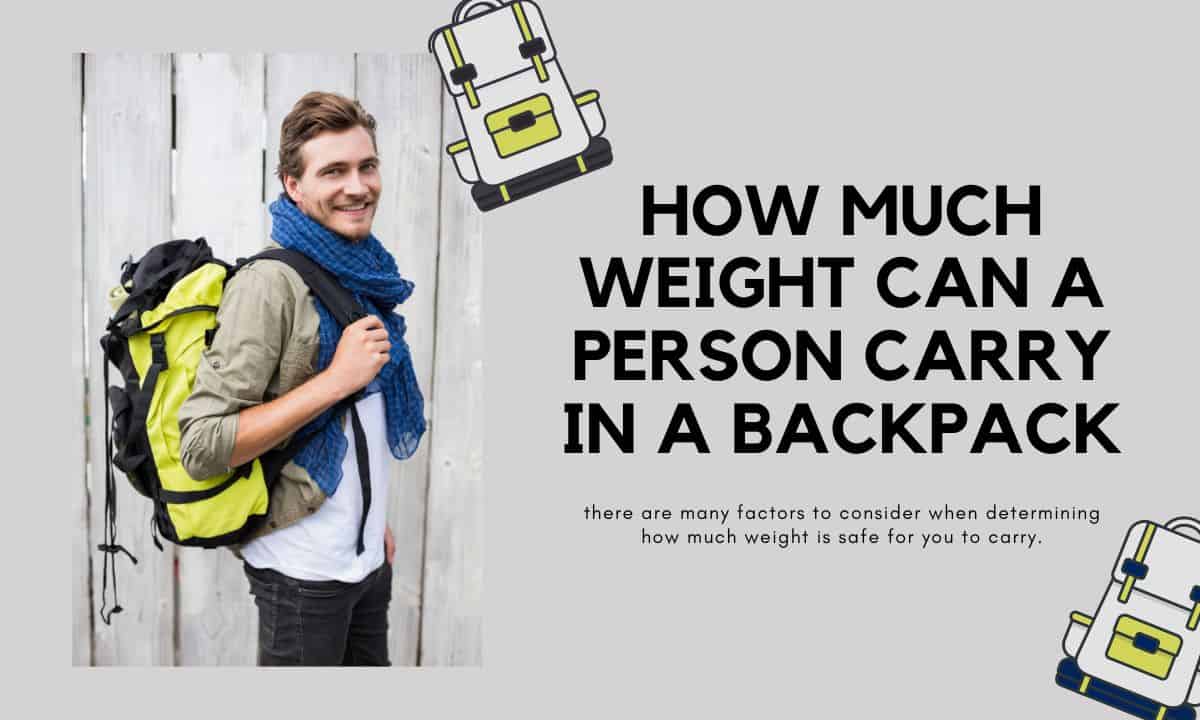
If you’re new to hiking or backpacking, it’s always best to start with a lighter load so that you can get used to carrying the weight on your back. Here are some tips for determining how much weight is safe for you to carry in your backpack:
Lightweight Backpacking Base Weight
Lightweight backpacking is all about minimizing the weight of your gear so you can travel lighter and faster. Base weight is the weight of your backpack and contents without including food, water, or fuel. So how do you determine your base weight?
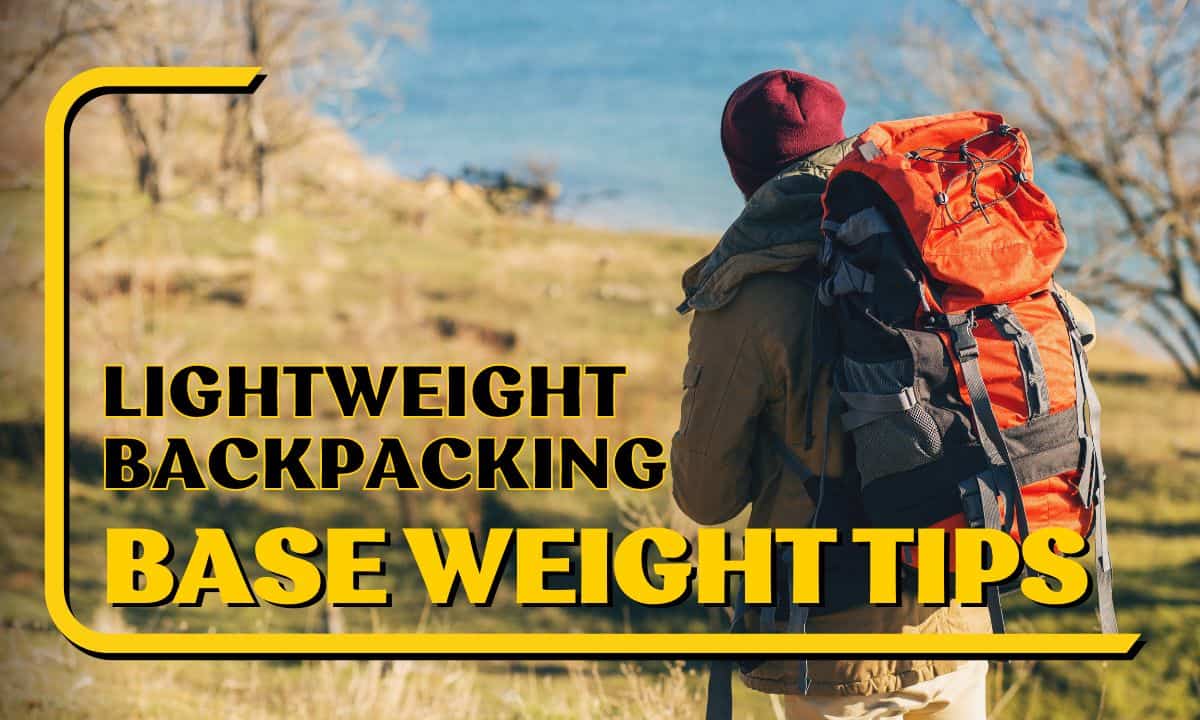
Image by marymarkevich on Freepik
First, start by evaluating what kind of gear you need for the type of trip you’re taking. Then, consider what can be left at home or replaced with a lighter alternative. For example, a tent can be replaced with a tarp and sleeping bag liner.
Next, weigh each item of gear individually and add it up to get your total base weight. Once you know your base weight, you can work on reducing it even further. The goal is to have a base weight that’s around 10% of your body weight.
For most people, this means carrying less than 20 pounds (9 kg) of gear. To get there, you might need to invest in some ultralight gear like a quilt instead of a sleeping bag or hiking poles made from carbon fiber instead of aluminum. Reducing your base weight has many benefits.
It makes hiking easier and more enjoyable since you’re not lugging around unnecessary weight. It also allows you to move faster and cover more ground each day. And if an emergency situation arises, having a lighter backpack will make it easier to evacuate quickly if necessary.
How Much Does an Empty Backpack Weigh Kg
You may be surprised to learn that an empty backpack can weigh quite a bit. In fact, the average empty backpack weighs between 1 and 2 kilograms. That means that if you’re carrying a heavy load, your backpack could easily weigh 10 kilograms or more.
So why do backpacks weigh so much? It’s because they’re made from sturdy materials like nylon and polyester. These materials are designed to withstand a lot of wear and tear, which is why they’re often used for outdoor gear like tents and sleeping bags.
And while these materials are very strong, they also add a lot of weight to your pack. If you’re looking to save some weight, there are a few things you can do. First, consider switching to a lighter material like Dyneema or Cuben fiber.
These materials are much stronger than nylon and polyester but don’t weigh as much. Second, look for a backpack with fewer pockets and compartments. The more pockets and compartments your pack has, the heavier it will be.
And finally, think about what you really need to bring with you on your hike or camping trip. If you can leave something behind, do it!
Average Backpack Weight Empty
When it comes to backpacks, there is no “one size fits all” answer. The best backpack for you depends on many factors, including your body type, the type of hiking you plan to do, and the amount of gear you need to carry. That said, there are some general guidelines that can help you choose the right backpack.
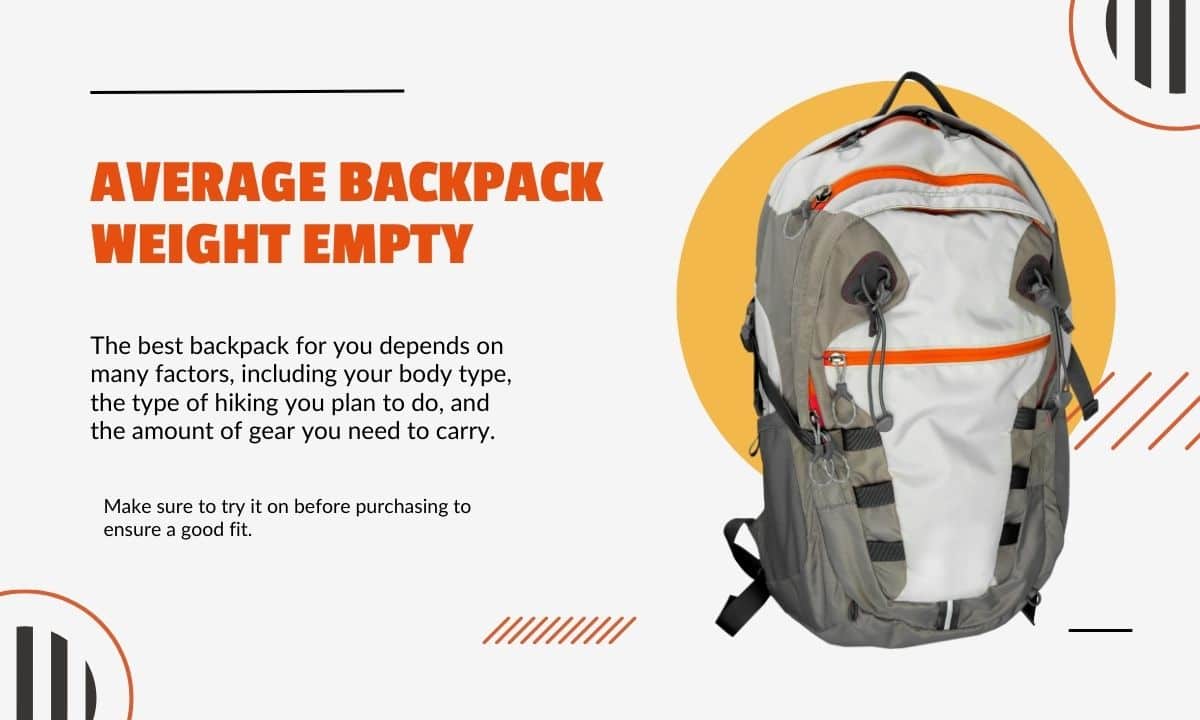
One important factor to consider is the weight of your backpack when it’s empty. Most backpacks range from 2-4 pounds when they’re empty, but some ultralight models can weigh as little as 1 pound. If you plan on carrying a lot of gear or hiking long distances, a heavier backpack may be worth the extra weight.
But if you’re only planning on using your backpack for short day hikes or light overnight trips, then a lighter model will be more comfortable and easier to manage. Another thing to keep in mind is that the larger and more feature-packed a backpack is, the more expensive it will be. So if you don’t need all the bells and whistles offered by larger models, go with a smaller and simpler option to save some money.
No matter what kind of backpack you choose, make sure to try it on before purchasing to ensure a good fit. And remember – even the best backpack won’t do much good if it’s not packed properly!
Average Backpack Weight for Appalachian Trail
The average backpack weight for Appalachian Trail thru-hikers is between 10 and 20 pounds. This includes the weight of the backpack, plus all of the gear and supplies that are carried inside it. The actual weight will vary depending on the individual’s gear choices and how much food and water they are carrying.
A lighter pack will be easier to carry and will allow for more miles to be covered each day. However, a heavier pack may be necessary if hiking in colder weather or carrying a lot of extra food and water.
Conclusion
How Much Weight Should You Carry Backpacking? The amount of weight you should carry backpacking depends on a few factors, such as your fitness level, the terrain you’ll be hiking, and how long you’ll be out on the trail. A general rule of thumb is to pack so that your backpack weighs no more than 10-12% of your body weight.
So, if you weigh 150 pounds, your backpack should weigh no more than 15-18 pounds. Of course, this is just a general guideline and you may need to adjust up or down depending on your individual circumstances.

